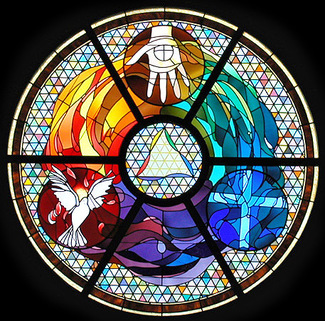“The
Lord is God in the heavens above and on the earth below.” That’s what Moses has to say to his
people. They’ve been rescued by God from
slavery in Egypt, they’ve encountered him and received the Law on the mountain,
they’ve wandered the wilderness led by him, and now they stop on the plains
before crossing the water into the Promised Land, and listen to Moses, who proclaims
to them: “The Lord is God in the heavens above and on the earth below.” And he proclaims it, because it matters. I think we’re probably on board with God
being God in heaven; it’s God on earth we might be disquieted by. The idea that God, while totally incomparable
to any finite, fallible, created thing, enters into our world, acts, concerns
Himself intimately with each one of us, with our greatest triumphs, with the
most mundane pieces of daily life, and with our sin, our hunger, our weakness and
our need… it’s almost too much to bear.
God loved Israel so much he wanted to make them His own, and he loves us
the same. That changes everything, and that’s
not always comfortable. He offers us a
mutual binding: he’ll commit to us, and He longs for us to commit to Him. He’ll lead us, to the Promised Land; and
that’s first gift and then invitation: for us to follow.
He longs
so much for us to follow that he sent his only Son, that we might see what
divine love looks like in human form. In
our Gospel, we read of a bunch of disciples who get it; they respond to the
appearance of Christ, after the resurrection, with worship. They get that he is worthy of all
praise. But, they still doubt. Their worshiping instinct is well-formed, but
their heads kind of lag behind. Descartes had it wrong when he said that
thinking is the most basic human act; we’re formed for worship. bBfore we’re homo
sapiens (a human who’s wise), we’re homo adorans (a human that
adores, that worships). The disciples
doubt, but maybe that’s not so much an intellectual doubt as a nervous
wavering. Their worshiping instinct might be stronger than their courage to
act. So, Jesus approached them. He acts.
He doesn’t remain distant. Jesus
approaches his nervous wavering Church.
Jesus never tires of approaching us when we waver. And even the disciples’ doubt can be used for
good by God, for when we hear of it, and when we hear of Jesus approach to
them, their doubt gives us hope.
And that
hope is secure because like the Israelites, we have been invited into God’s
Promised Land. That invitation is given a new, more vibrant hew, in Jesus’
words: through baptism, we enter into the name of the Father, and of the Son
and of the Holy Spirit – we enter into God’s own divine life! Water, that most mundane of things, that
takes up two-thirds of the earth’s surface, becomes a means of entering not
just a physical Promised Land, but the promise of life, the divine loving life
that binds Father, Son and Spirit, itself.
With Christ, we can call upon our God as Abba Father, and rely on his
care. In our common adoption as sons and
daughters, we find a new union with Christ, God with us, and our brother. And we find the Holy Spirit joining with our
spirit, God dwelling within us, and praying with us and for us in sighs too
deep for words.
That’s the
mystery of the Trinity; it isn’t some clever puzzle with numbers. Now, we know
God is one from the Old Testament. Karl Barth, a Reformed theologian,
commenting on the passage from Deuteronomy we just heard commented that “it is
in His love above all that God reveals Himself as the One who is incomparable
and therefore unique.” Moses asks the people, has anyone ever heard of
something so marvelous before? And they say, no.
But, God’s
oneness, the incomparability of God’s love, isn’t a limitation, can’t be
understood in any way that would make Him less loving. We know that God is
love. But, if God’s oneness were limiting, that would mean that before
creation, God had no-one to love. God would have been reduced to just
self-love, which is something radically different from relationship. God would only
have created out of neediness. And that’s not our God. No, God is loving
relationship from the beginning (from ‘before’ any beginning). Father, Son and Holy
Spirit. That love overflows into creation. Creation isn’t what God need to be
loving, creation is what happens when that pre-original love overflows.
We see
that love between Father, Son and Spirit most clearly in the gospels at Jesus’
own baptism, where the Son is baptized, the Spirit descends upon him and the Father
tells how much he loves the Son. It’s may be no surprise then, that Jesus tells
us that it’s in our baptism that we enter into that incomparable Love that is God,
when we are united to the Son, the Spirit descends on us, and the Father sings
out, “This is my beloved daughter, this is my beloved son.” To celebrate the
Trinity isn’t to try to do a weird number puzzle; it’s to be over-awed by a love
that would welcome us.

No comments:
Post a Comment